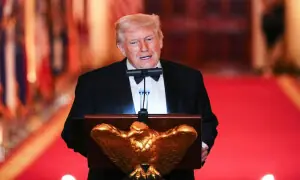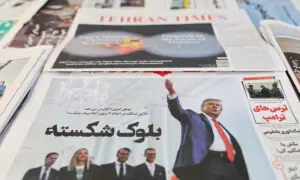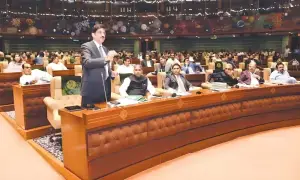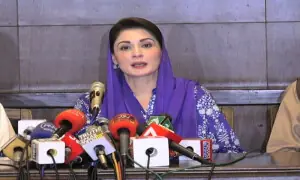Khan highlights role of ‘third umpire’ in NAB chairman’s appointment
5 min readIt was the second time in the NAB law tweaks case hearing that former prime minister Imran Khan interacted with the five-judge bench on Thursday. At one point, he highlighted the role of “third umpire”—a term used colloquially by Khan for the establishment—in the anti-graft buster chief’s appointment.
A five-member SC bench comprising Chief Justice of Pakistan Qazi Faez Isa, Justices Aminuddin Khan, Jamal Khan Mandokhail, Athar Minallah and Azhar Hasan Rizvi heard the pleas against the NAB law tweaks.
When his turn came in the hearing, presiding judge Chief Justice of Pakistan Qazi Faez Isa questioned Khan if he wanted to add anything to the case. The CJP advised Khan to stick to the case and not discuss his personal circumstances in jail.
In response, Khan asked if he had done any “point-scoring”, to which the CJP stated that the matter had already been decided.
The PTI founder said that his statement suggested that he was an “irresponsible person”. He clarified that he was not a “dangerous man”.
Justice Aminuddin Khan commented that Khan had received “unnecessary relief” and should focus only on the case.
The CJP clarified that judges do not explain their decisions and that Khan could file a review petition if he wished.
The former prime minister expressed his opposition to the government’s appeal against the court’s decision to declare the NAB amendments.
While speaking about his sentence in the state gifts case, he claimed that the Rs20 million worth of the watch was shown as Rs3 billion. He demanded that the NAB chairman be appointed by the Supreme Court.
He said that NAB was not under his government’s control even in their time.
Justice Athar Minallah said that there was no reason to declare such amendments null and void. “Perhaps you did not read my note,” the judge said and asked the former prime minister if he would keep believing in the national graft buster.
Khan said that after what “NAB did to him in five days, how could he trust” them now?
When referring to the former premier, Justice Mandokhail said that “more maturity” came after going to jail.
Khan claimed the system was the same 27 years ago which led him to enter politics, and $7 trillion of poor countries’ money was stashed abroad which needed to be retrieved.
The PTI founder said that when there was “no consensus between government and opposition on NAB chairman, then a third umpire makes the appointment. NAB remains under the control of this third umpire. NAB was not under our control even during our tenure.”
He further said that in Britain, the democratic system was based on ethics, the rule of law, and accountability.
Justice Mandokhail questioned whether or not Parliament can make amendments, to which former PM Khan responded that the “Form 47 holders”—a reference to the incumbent government—cannot make amendments.
The judge then observed that Khan was “again going towards the pending cases”. The petitioner stated that he was currently “bearing the brunt of NAB [National Accountability Bureau’]”.
When the court inquired if NAB would continue to function in the same manner, Khan said the anti-corruption body needed to improve, and that a specialised agency was required to fight corruption.
At this point, Justice Minallah reminded the parties about the pending issue of the appointment of the chief election commissioner and election commission members.
Addressing the court, Khan said that restoring the amendments would ease his situation, but it would lead the country into bankruptcy. He also mentioned that several names have surfaced in the “Dubai Leaks,” with money being sent out of the country.
To this, Justice Mandokhail expressed concern, stating that Khan’s statements are “frightening”. He advised Khan to sit with fellow politicians to find a solution if the situation was “so dangerous”.
Khan further drew a parallel, stating that in India, Arvind Kejriwal was released and his sentence was suspended, allowing him to contest elections while he himself was sentenced within five days and barred from elections.
Justice Mandokhail stated that the political system was not created by the judiciary.
Justice Minallah expressed sympathy for Khan, saying “he is in jail but people have high hopes” for him.
Khan said there was an “undeclared martial law” in Pakistan, and the people are looking towards the Supreme Court.
Justice Mandokhail warned that politicians would be responsible, not the judiciary, if anything happened to the country. He said the judiciary was watching the situation closely.
When the PTI chief tried to refer to the cipher case, CJP Isa stopped him and the appeal in the case might come before them.
CJP Isa said their concern was that Khan would not discuss the sub-judice cases.
Justice Azhar questioned why the ex-PM did not oppose the NAB bill in Parliament, to which, Khan replied that the circumstances had become such that he could not challenge the “conspirator government” in parliament.
Khan told the judge that he was older than him.
Justice Minallah acknowledged Khan’s influential position as the head of a major political party with millions of supporters, despite being in jail.
Khan claimed that there was tyranny against them and there was an undeclared martial law. “The Supreme Court is my last hope.”
Justice Mandokhail stated that their “real grievance” was with the politicians. “If we also fail, God forbid, what will happen?”
The PTI founder added that the country was facing an economic crisis and that the “elite are sending the remittances from abroad back out of the country.”
CJP Isa intervened and told Khan that he was mixing two things. He added that dialogue can solve many issues.
Justice Minallah then remarked that it was also the responsibility of lawyer Farooq Naek and added that politicians must also realise this.
“We have always kept our doors open,” Naek said.
CJP Isa noted that Khan seated in the hearing “with a lot of patience all day.”
For the latest news, follow us on Twitter @Aaj_Urdu. We are also on Facebook, Instagram and YouTube.
























Comments are closed on this story.